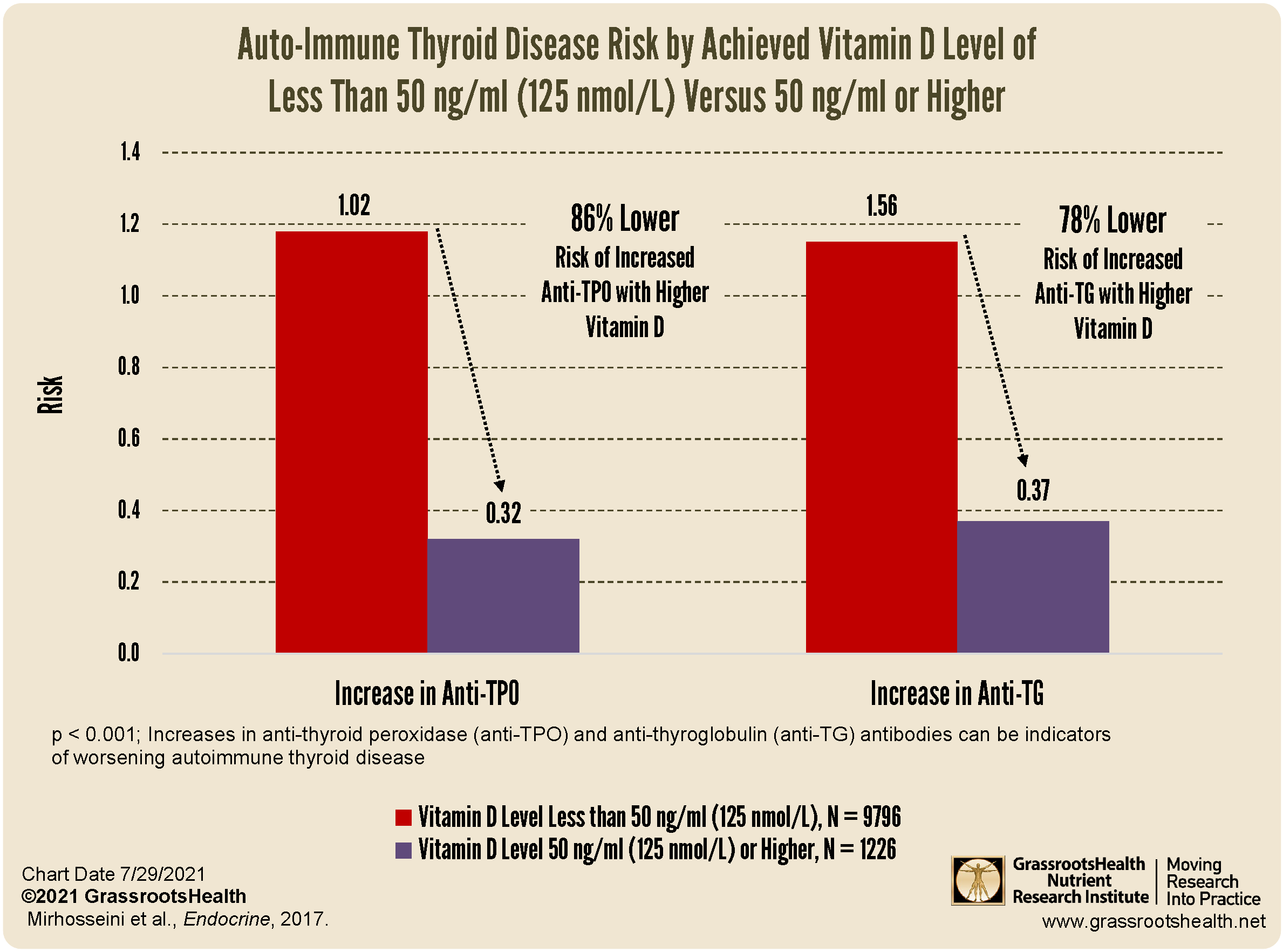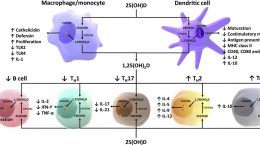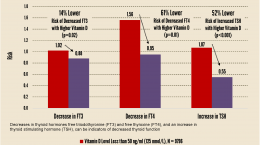Published on August 9, 2021
Study shows supplementing to achieve a vitamin D level of at least 40 ng/ml (100 nmol/L) significantly decreased auto-immune thyroid disease
 Autoimmune disease happens when our own immune system begins attacking our own cells. Examples of autoimmune diseases include multiple sclerosis (affecting the myelin, a substance that protects nerve cells), type 1 diabetes (which affects cells of the pancreas), celiac disease (affecting the small intestine), and auto-immune thyroid diseases, such as Hashimoto’s thyroiditis and Grave’s disease. Vitamin D deficiency is a risk factor for many auto-immune diseases, and correcting vitamin D deficiency or overcoming vitamin D resistance can be key in addressing autoimmune disorders.
Autoimmune disease happens when our own immune system begins attacking our own cells. Examples of autoimmune diseases include multiple sclerosis (affecting the myelin, a substance that protects nerve cells), type 1 diabetes (which affects cells of the pancreas), celiac disease (affecting the small intestine), and auto-immune thyroid diseases, such as Hashimoto’s thyroiditis and Grave’s disease. Vitamin D deficiency is a risk factor for many auto-immune diseases, and correcting vitamin D deficiency or overcoming vitamin D resistance can be key in addressing autoimmune disorders.
What are Auto-Immune Thyroid Diseases?
Auto-immune thyroid diseases are the most prevalent organ-specific auto-immune diseases, with Hashimoto’s thyroiditis being the major cause of hypothyroidism and Grave’s disease being the major cause of hyperthyroidism. Vitamin D status may affect the presence of both of these diseases, with an increased risk of measures indicative of thyroid autoimmunity, including increased thyroid autoantibody levels, increased anti-thyroid peroxidase (anti-TPO), and increased anti-thyroglobulin (anti-TG) antibodies, associated with vitamin D deficiency (levels below 20 ng/ml or 50 nmol/L).
Vitamin D Levels Above 50 ng/ml Decreased Auto-Immune Thyroid Disease Activity
A study by Mirhosseini et al. reviewed the effects of vitamin D on multiple aspects of thyroid function. The study provided vitamin D supplementation (average dose 6000 IU/day) with the intention of achieving a vitamin D level of at least 40 ng/ml (100 nmol/L). Vitamin D and thyroid measures (including TSH, FT4, FT3, and thyroid antibodies) were taken at baseline and at follow-up, about one year later. The study found a 30% reduced risk of hypothyroid at the end of the supplementation program (findings covered in detail in a previous post here) and a 32% reduced risk of elevated anti-thyroid antibodies among participants whose vitamin D level was 50 ng/ml (125 nmol/L) or higher.
Average anti-thyroid antibody levels among the participants were elevated at the beginning of the study, but significantly decreased after participating in the vitamin D supplementation program. Among those whose anti-thyroid antibody levels were elevated at the start, anti-TG levels normalized among 77.5% by follow up (with a 78% decreased risk of elevated anti-TG for those achieving 50 ng/ml vitamin D or higher, p<0.001), and anti-TPO levels normalized among 42.2% by follow up (with an 86% decreased risk of elevated anti-TPO for those achieving 50 ng/ml vitamin D or higher, p<0.001).
By the end of the vitamin D supplementation program, only:
- 20% had at risk anti-TPO levels, compared to 32% at baseline
- 21% had at risk anti-TG levels, compared to 93% at baseline
- 9% had both at risk levels of anti-TPO and anti-TG, compared to 29% at baseline
Overall, for those at-risk for autoimmune thyroid disease at the beginning of the study, more than 60% were no longer considered at-risk at follow-up.
Make Sure You Are Getting Enough Vitamin D and Other Important Nutrients – Measure Your TSH as Well!
 Having and maintaining healthy vitamin D levels and other nutrient levels can help improve your health now and for your future. Choose which to measure, such as your vitamin D, omega-3s, and essential minerals including magnesium and zinc, by creating your custom home test kit today. Take steps to improve the status of each of these measurements to benefit your overall health. You can also track your own intakes, symptoms and results to see what works best for YOU.
Having and maintaining healthy vitamin D levels and other nutrient levels can help improve your health now and for your future. Choose which to measure, such as your vitamin D, omega-3s, and essential minerals including magnesium and zinc, by creating your custom home test kit today. Take steps to improve the status of each of these measurements to benefit your overall health. You can also track your own intakes, symptoms and results to see what works best for YOU.
Enroll and test your levels today, learn what steps to take to improve your status of vitamin D (see below) and other nutrients and blood markers, and take action! By enrolling in the GrassrootsHealth projects, you are not only contributing valuable information to everyone, you are also gaining knowledge about how you could improve your own health through measuring and tracking your nutrient status, and educating yourself on how to improve it.
Help everyone Move Research into Practice with vitamin D and other nutrients! As a special birthday gift to everyone, in honor of the science, we have created a special scholarship fund for anyone to donate to that will go towards helping others participate. Your donation will allow anyone to get help with funding their participation when they need it.
Text-to-give: Text Daction to 44321 to add to our Scholarship Fund.






